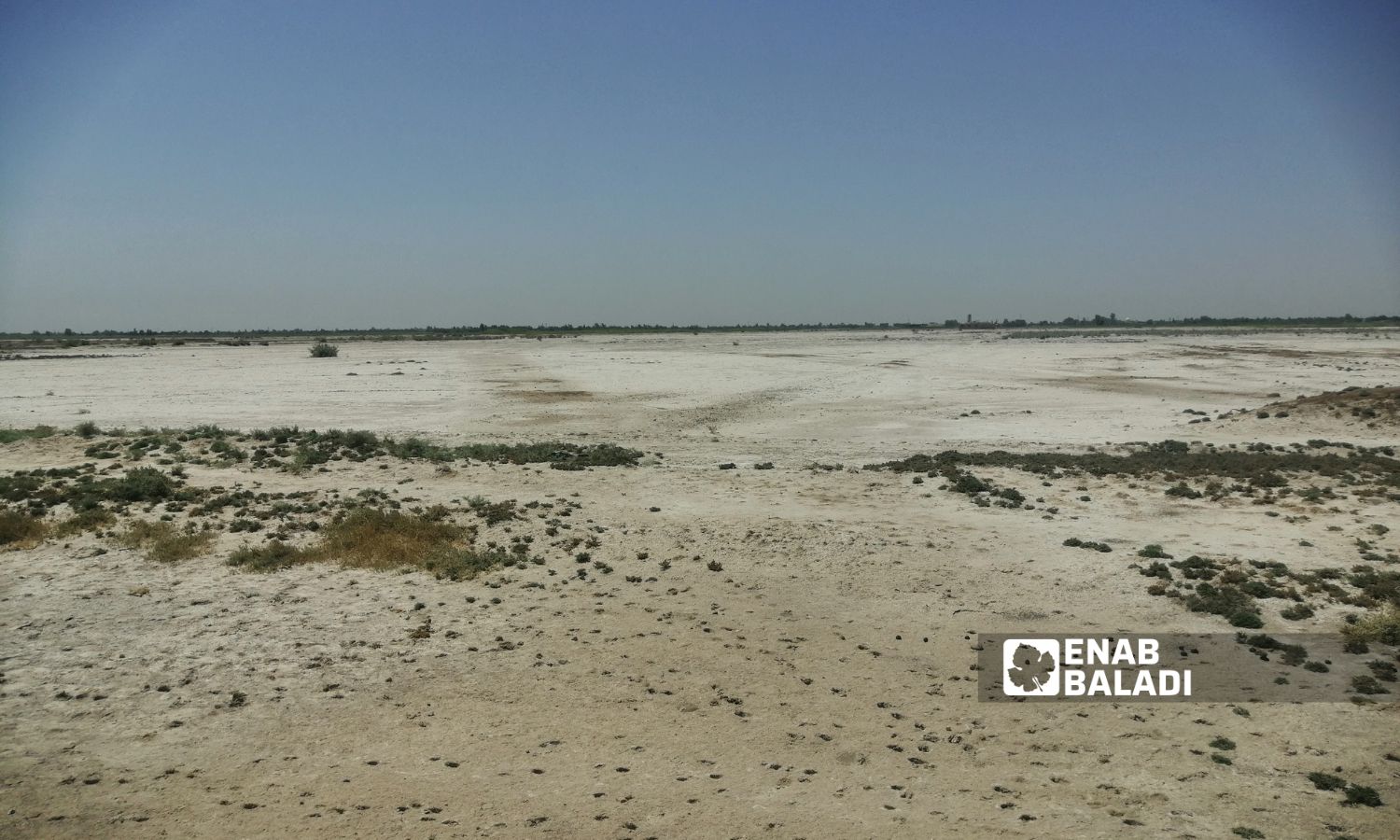



Deir Ezzor – Obadah al-Sheikh
Farmers are unable to compensate for their losses due to soil salinity in the eastern countryside of Deir Ezzor governorate.
Salinity affected the growth of crops and vegetables, the quality of groundwater, and even the infrastructure of roads and buildings.
Farmers in the city of al-Shuhail, east of Deir Ezzor, in areas controlled by the Kurdish-led Autonomous Administration of North and East Syria (AANES), told Enab Baladi that the spread of salinity in large areas of their lands has made many of them refrain from cultivating the lands for a while.
They attributed the spread of salinization to the slow cleaning and rehabilitation of excess water drains, as its accumulation over long periods of time causes soil salinity, and this matter falls on the responsibility of the Irrigation Office.
One of the workers at the irrigation station in the village of al-Shuhail, who kept his name anonymous because he was not authorized to make a statement to the media, told Enab Baladi that the salinization resulted from the vertical wells being out of service since 2013.
He added that of the 85 wells in the region, only ten are currently operating after local initiatives led to their operation.
Meanwhile, a large portion of these wells were vandalized and stolen, as boot stations, electricity cables, and covered drainage networks responsible for drawing excess water from the soil and discharging it into the Euphrates River were looted.
According to statistics compiled by the Irrigation Committee of the Autonomous Administration in the region, between 23,000 and 25,000 dunams were exposed to salinization, and their soil became unsuitable for agriculture. (Dunam is about 900 m2)
In order to rehabilitate the area agriculturally, the worker at the irrigation station said that the region’s authorities must launch a project to reclaim the damaged agricultural lands, which begins with restarting the vertical drainage wells on all of the agricultural lands and repairing the drainage networks there.
The irrigation department in the village of al-Shuhail previously approached the Autonomous Administration and organizations working in the area to reclaim the soil in the area, but the high cost of the project prevented securing a continuous electrical supply source for the vertical drainage networks, the worker said.
Abu Bassam, a farmer from al-Shuhail, says that his 275 dunams are not suitable for agriculture due to soil salinity.
He added to Enab Baladi that neglecting to implement solutions on agricultural lands by the region’s authorities may threaten food security, and despite the continued demands to provide solutions, the Autonomous Administration has not initiated any project in this regard.
Omran al-Dhiab, also a farmer from al-Shuhail, stated that he repeatedly called on the Autonomous Administration and international and local organizations to intervene to prevent the increase in soil salinity, and he received many promises, but none of them were implemented on the ground, he told Enab Baladi.
The AANES did not respond through official digital contacts to Enab Baladi’s questions in this regard.
Agricultural engineer Khalaf al-Hanshoul believes that soil salinity is considered one of the most important indicators that can be monitored in the region and that there are areas of land that will become unsuitable for agriculture in the future.
He said that the areas of land with high salinity between the towns of Dhiban and al-Shuhail, passing through al-Hawaij, fall within the scope of work of the “Sixth Irrigation Sector” in the eastern countryside of Deir Ezzor, with an area of about 23,000 dunams.
This sector was previously well-produced agricultural land, but due to the surrounding conditions, the practice of simple and unscientific agricultural work, and technical errors, these lands turned into relatively uncultivable areas.
He added that the solutions to restore fertility to these areas lie in cleaning the main and subsidiary agricultural drains, repairing and operating vertical drainage wells, expanding the encroached horizontal drains, cleaning the sewers in them, and most importantly, rationalizing the use of irrigation water for single irrigation, and not following the flood irrigation method.
Al-Hanshoul said that the region’s farmers must plant suitable and salt-resistant plants such as Sesbania, barley, sugar beet, clover, rye, and bonicam.
He also advised using special tillage methods suitable for salty lands, in addition to washing the lands, calculating the amounts of water added to the plant’s needs periodically, and following modern irrigation methods in agriculture, such as long irrigation lines.
if you think the article contain wrong information or you have additional details Send Correction